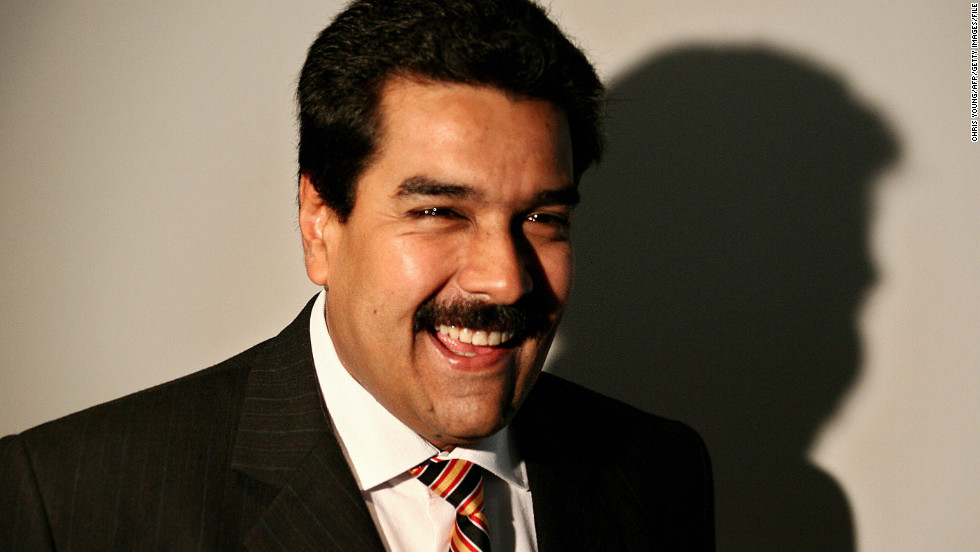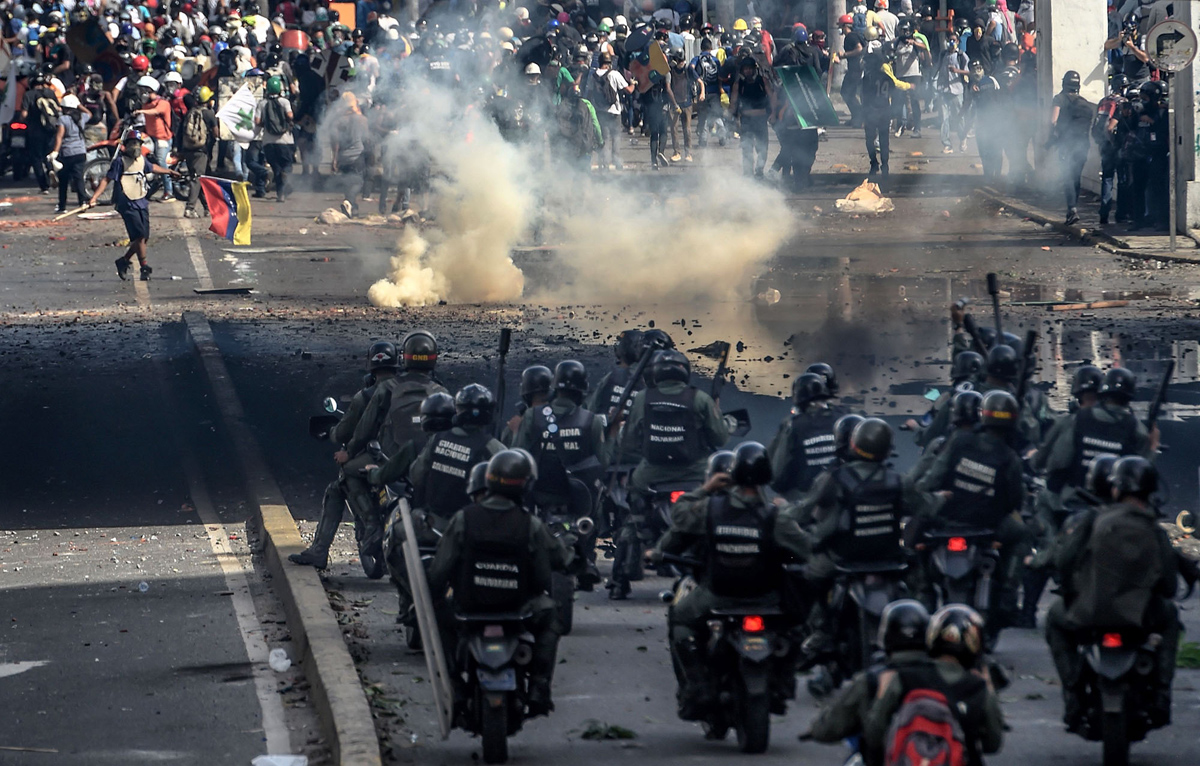Venezuela President Maduro blames Colombia and the U.S. State of Florida as 6 terrorist detained in failed assassination attempt
According to reports, assailants flew two drones each packed with 1 kilogram (2.2 pounds) of C-4 plastic explosive toward Maduro, his wife and other top leaders as he spoke Saturday evening at an event celebrating the 81st anniversary of the National Guard, said Interior Minister Nestor Reverol. One of the drones was to explode above the president while the other was to detonate directly in front of him, he added.
The long running political crisis has been taking place in Venezuela since 1999 under the presidency of Hugo Chávez and has continued into the current presidency of Nicolás Maduro. Since the death of Hugo Chavez the situation worsened. The current situation is the worst economic crisis in Venezuela’s history.After Chavez came to power in 1999, Maduro participated in an assembly that drafted a new constitution. He served as a congressman until 2006, when he was tapped as foreign minister. In 2013 former President Hugo Chavez appointed Nicolas Maduro as Vice President. That appointment led the way for Maduro to be Chavez successor after his death.

Nicolas Maduro (shown in 2007).
Many see the Maduro presidency as a continuation of the the Chavez leadership and believe this is a stronghold on Venezuela by the left wing Socialist government. This did not sit well with the United States and many in the West.
Venezuela has the largest proven oil reserves in the world, estimated at around 302 billion barrels.
United States–Venezuela relations are the bilateral relations between the United States of America and the Bolivarian Republic of Venezuela. Relations have traditionally been characterized by an important trade and investment relationship and cooperation in combating the production and transit of illegal drugs. Relations were strong under traditional governments in Venezuela, such as those of Carlos Andrés Pérez and Rafael Caldera. However, tensions increased after the socialist President Hugo Chávez assumed elected office in 1999. Tensions between the countries further increased after Venezuela accused the administration of George W. Bush of supporting the Venezuelan failed coup attempt in 2002 against Chavez, an accusation that was partly retracted later. Venezuela broke off diplomatic relations with the U.S. in September 2008 in solidarity with Bolivia after a U.S. ambassador was accused of cooperating with violent anti-government groups in that country, though relations were reestablished under President Barack Obama in June 2009. In February 2014, the Venezuelan government ordered three American diplomats to leave the country on charges of promoting violence.
After Hugo Chávez was first elected President of Venezuela by a landslide in 1998, the South American country began to reassert sovereignty over its oil reserves. This action challenged the comfortable position held by U.S. economic interests for the better part of a century. The Chávez administration overturned the privatization of the state-owned oil company PDVSA, raising royalties for foreign firms and eventually doubling the country’s GDP. Those oil revenues were used to fund social programs aimed at fostering human development in areas such as health, education, employment, housing, technology, culture, pensions, and access to safe drinking water.
Chávez’s public friendship and significant trade relationship with Cuba and Fidel Castro undermined the U.S. policy of isolating Cuba; moreover, on Chavez’s initiative, long-running ties between the U.S. and Venezuelan militaries were severed. During Venezuela’s presidency of OPEC in 2000, Chávez made a ten-day tour of OPEC countries. In the process, he became the first head of state to meet Saddam Hussein since the Gulf War. The visit was controversial both in the U.S., although, Chávez did respect the ban on international flights to and from Iraq as he drove from his previous stop in Iran. https://en.wikipedia.org/wiki/United_States%E2%80%93Venezuela_relations
Assassination attempt against Venezuelan president Maduro. Auguest 4, 2108
The political conflict between Venezuela and the United States created a dire economic crisis in the country. Multiple US sanctions caused the Venezuela dollar to hit a record low.
In an article titled, “Venezuela’s Deepening Crisis Triggers Mass Migration Into Colombia”, NPR wrote: Venezuela’s downward economic spiral has led to widespread food shortages, hyperinflation and now mass migration. Many Venezuelans are opting for the easiest escape route — by crossing the land border into Colombia. The articled continued, there were more than half a million Venezuelans in Colombia as of December, according to the Colombian immigration department, and many came over in the last two years. Their exodus rivals the number of Syrians in Germany or Rohingya in Bangladesh. Ian Bremmer, president of the Eurasia Group, a political risk consulting firm, calls it the world’s “least-talked-about” immigration crisis. https://www.npr.org/sections/parallels/2018/02/20/587242391/venezuelas-deepening-crisis-triggers-mass-migration-into-colombia.
There have been mass anti-government protest, looting and deadly violence.

According to The Atlantic, beginning on April 1, anti-government demonstrators have staged daily protests across Venezuela that continue to devolve into violent clashes with riot police, leaving thousands arrested, hundreds injured, and 66 dead. Opposition activists are protesting against the government of President Nicolas Maduro, blaming him for a crippling economic crisis that has caused widespread food shortages for years. The head of the Venezuelan military has warned troops not to commit “atrocities” against protesters, while Maduro’s government continues to work toward rewriting the constitution, defying those accusing him of clinging to power. https://www.theatlantic.com/photo/2017/06/months-of-anti-government-protests-continue-in-venezuela/530031/
Authorities detained six people suspected of using explosives-laden drones in a failed bid to assassinate Venezuelan President Nicolas Maduro, officials said Sunday.
The government alleged that opposition factions conspired with assailants in Miami and Bogota, although they offered no specific evidence. Opposition leaders decried Maduro for broadly singling out his political opponents, and they warned he may use it to further suppress his critics.
“This was an attempt to kill me,” he said.
Maduro said the “far right,” working in coordination with others in Bogota and Miami, including Colombian President Juan Manuel Santos, were responsible. Colombia’s government has vehemently denied Santos had any role in the drone attack.
Maduro, who also says that Washington supports his political opponents, called on U.S. President Donald Trump to hold the “terrorist group” accountable. https://www.sacbee.com/news/nation-world/world/article216127670.html.
The United States deny any involvement in the assassination attempt.
